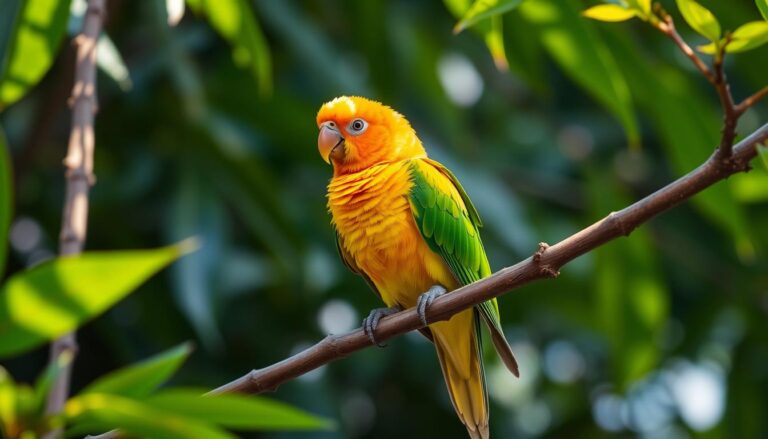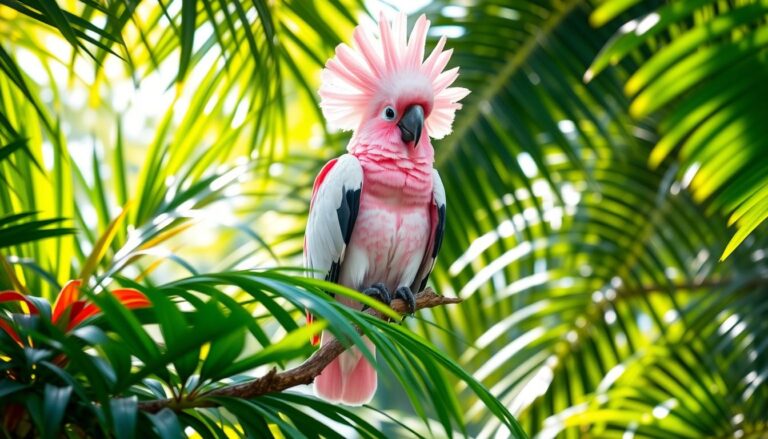Do Cockatiels Talk? | Learn About Cockatiel Talking Ability & Training Tips
Cockatiels are charming and beloved pets. They have endearing personalities. One interesting thing about them is their ability to talk, which can strengthen the bond between a cockatiel and its owner.
In this article, we’ll look at how well cockatiels can talk. We’ll also explore what affects their talking skills. Plus, we’ll share tips on how to teach your cockatiel to talk.
Key Takeaways
- Cockatiels can mimic human speech and other sounds.
- Age, gender, environment, and training all impact a cockatiel’s talking ability.
- Using positive reinforcement and consistent training is key to teaching a cockatiel to talk.
- Talking cockatiels offer many benefits, like better companionship and mental stimulation.
- It’s important to understand individual differences and debunk myths when teaching a cockatiel to talk.
What Are Cockatiels?
Cockatiels, or Nymphicus hollandicus, are a favorite among bird lovers. They come from Australia’s dry lands. Their unique voices and personalities make them a hit among bird fans.
Origins and Characteristics
Cockatiels stand out with their crest, long tail, and sturdy build. They have gray feathers with yellow and white highlights. These birds are curious and loving, perfect for those ready to care for them.
Cockatiel Vocalization Abilities
Cockatiels are amazing at making sounds. They can mimic many voices, including humans. Not every cockatiel talks, but many learn words with training.
- Male cockatiels are usually more talkative, showing off to attract mates.
- Young cockatiels are more likely to talk and learn, as their skills grow.
- Their environment and how much they interact also affect their talking.
Knowing about cockatiels is key for those thinking of getting one. With proper care, they can be fun and engaging friends.
Do Cockatiels Talk?
Cockatiels are known for their charming personalities and captivating vocalizations. But, do they actually talk? The answer is not a simple yes or no. Cockatiels can mimic human speech, but it depends on the bird and the training they get.
Cockatiels belong to the cockatoo family, known for their intelligence and vocal abilities. They have the right anatomy to make sounds like humans. But, they naturally prefer to make calls, whistles, and chirps.
Not all cockatiels will learn to talk. Some may learn a few words with lots of training, while others won’t. Their ability to talk depends on their age, gender, and how they are raised and trained.
Cockatiel Talking Ability
While not all cockatiels talk, those that do can be impressive. Some can mimic a large vocabulary, including words and short phrases. Their talking ability depends on their personality, training, and interaction with owners.
Even if cockatiels don’t talk, they can still be great companions. Their natural sounds, like whistles and chirps, are engaging and important for their communication with humans.
“Cockatiels have the potential to learn a few basic words and phrases, but their talking abilities are generally more limited compared to other parrot species, such as the African Grey or Amazon parrots.”
The question of whether cockatiels can talk is complex. While some surprise their owners with their talking, it’s not true for all. Knowing what influences a cockatiel’s vocal development helps owners understand their birds better and care for them well.
Factors Influencing Cockatiel’s Talking Ability
Many things affect a cockatiel’s ability to talk, like age, gender, and training. Knowing these can help owners get the most out of their bird’s talking skills. It also builds a strong bond through talking.
Age and Gender
Cockatiels start making sounds and mimicking voices at 3-6 months old. Males usually talk more than females. As they get older, some birds get really good at mimicking human speech.
Environment and Training
The place a cockatiel grows up in and how much it talks to people matters a lot. Birds that are social, hear lots of human voices, and get praised for talking tend to do better.
| Factor | Impact on Cockatiel Talking |
|---|---|
| Age | Cockatiels start making sounds and mimicking voices at 3-6 months old. They get better with age. |
| Gender | Male cockatiels usually talk more than females. |
| Environment | Well-socialized birds that hear lots of human voices tend to talk better. |
| Training | Using positive methods and consistent training helps birds talk more. |
Understanding these factors helps do male cockatiels talk owners create the best environment. They can also use good training methods. This supports the bird’s talking skills and helps them communicate better.
Cockatiel Talking Sounds
Cockatiels are known for their unique sounds. They can mimic human speech, which is fascinating. These birds can make a variety of sounds, from trills to clear words.
Understanding their talking sounds helps us connect with them better. It shows how they communicate and can strengthen our bond with them.
Common Words and Phrases
Cockatiels can learn and repeat many words and phrases clearly. Some common sounds they make include:
- Names (e.g., “Polly,” “Buddy,” “Coco”)
- Simple greetings like “Hello” or “Hi”
- Whistled tunes or melodies
- Distinctive calls like “Pretty bird” or “Good bird”
- Laughter or other playful sounds
How well a cockatiel talks depends on its age, personality, and training. With patience and consistent practice, some can learn many words and phrases.
Not every cockatiel talks the same way. Some might mimic sounds more than others. Their ability to make different sounds shows their intelligence and adaptability as pets.
Why Do Cockatiels Talk?
Cockatiels are known for their delightful vocalizations. They can mimic human speech, which is captivating. But why do some cockatiels talk more than others? Let’s explore the reasons behind their vocalizations.
Cockatiels talk because of their social nature and need for communication. They are intelligent and social birds. By mimicking human speech, they seek attention and affection from their owners.
Moreover, cockatiels are natural imitators. They use vocalizations to communicate in the wild. This talent often translates into learning human words and phrases as pets.
“Cockatiels are incredibly social birds, and their desire to communicate with their human companions is a key driver behind their talking ability.”
Not all cockatiels talk equally. Age, gender, and individual personality affect their talking abilities. The environment and training also play a role.
A cockatiel’s desire to talk shows their intelligence and adaptability. It’s a sign of their deep connection with humans. Understanding this behavior helps us appreciate their unique personalities.
Training Your Cockatiel to Talk
Teaching your cockatiel to talk is rewarding but needs patience and consistency. Focus on positive reinforcement to encourage your bird to talk.
Positive Reinforcement Techniques
Use positive reinforcement when training your cockatiel. Reward them with treats, praise, or affection for talking. This helps them see talking as a good thing.
- Give your cockatiel’s favorite treats, like millet or fruit, for talking.
- Use a warm tone and lots of praise when they make sounds.
- Make training fun by doing it daily.
Consistency and Patience
Learning to talk takes time for cockatiels. Be patient and consistent. Regular practice and positive feedback are key.
- Have short training sessions every day with the same words.
- Be patient if your cockatiel learns slowly. Every bird is different.
- Avoid scolding if they don’t talk fast. It can make them less willing to learn.
With patience and positive reinforcement, your cockatiel can become a confident talker. Teaching them to talk is as rewarding as the result.

Benefits of Having a Talking Cockatiel
Cockatiels are known for their fun personalities and ability to learn many sounds, including words. Having a talking cockatiel can greatly enrich your life. It can make both you and your pet happier. Let’s look at some key benefits of having a bird that can talk.
One big plus is the companionship and emotional bond you can share with a talking cockatiel. These smart birds form strong bonds with their owners. They learn to respond to their names and even chat a bit. Hearing your cockatiel say “Hello!” or share its thoughts can be very uplifting and help fight loneliness.
Also, a talking cockatiel can make your life more fun. Watching them mimic your words or sing can make you laugh. Teaching your cockatiel new tricks can also be very rewarding. It strengthens your bond and makes your life more interesting.
- Companionship and emotional connection
- Entertaining and amusing behavior
- Sense of accomplishment from teaching new skills
- Improved overall well-being and reduced stress
Training a cockatiel to talk can also be very rewarding for you. Seeing your pet learn and grow can make you feel proud and accomplished. The positive interaction and training can also make you and your cockatiel feel better, reducing stress and making life more enjoyable.
“Having a talking cockatiel is like having a feathered friend who can share in your joys and laughter. It’s a truly unique and rewarding experience.”
In summary, having a talking cockatiel offers many benefits. They provide companionship, entertainment, and a sense of accomplishment. If you’re thinking about getting a cockatiel, the chance to have a talking friend might be a great reason to do it.
Challenges of Teaching Cockatiels to Talk
Teaching cockatiels to talk can be tricky. It’s all about understanding each bird’s unique traits and adjusting the training to fit them.
Individual Differences
Not every cockatiel is the same when it comes to talking. Some are naturally better at mimicking human speech. This depends on their personality, genetics, and how they were raised.
This means you can’t use the same training method for all birds. It’s important to find what works best for each one.
- Some cockatiels may be shy and not want to learn to talk.
- Others might be more curious and eager to learn.
- Age and gender can also affect a cockatiel’s talking skills. Younger birds and females often do better.
Teaching do cockatiels talk requires patience and flexibility. You might need to try different methods and rewards to see what works for your bird.
“Every cockatiel is unique, and their talking ability can vary greatly. It’s important to understand and cater to their individual preferences and personalities during the training process.”
By recognizing these differences and tailoring the training, you can boost your chances of teaching your cockatiel to talk.

Debunking Myths About Cockatiel Talking
There are many myths about cockatiels and their talking abilities. It’s key to know the truth to fully appreciate these birds. Let’s look at and clear up some common myths about cockatiels and their voices.
“Cockatiels can’t talk.” This myth is wrong. Cockatiels can learn many words and phrases with the right training. They can become quite skilled at talking with patience and positive feedback.
“Only male cockatiels can talk.” Many think only males can talk, but that’s not true. Both males and females can mimic human speech. Males might talk more, but it’s not a rule.
- Any cockatiel can learn to talk with the right training and environment.
- Each bird’s personality and likes also affect how much they talk.
“Cockatiels only make basic sounds.” Cockatiels are known for their whistles and chirps. But they can do much more. With practice, they can mimic a variety of sounds, including words and tunes.
By clearing up these myths, we can truly enjoy cockatiels’ vocal talents. With proper care, training, and a good home, these birds can amaze us with their voices.
Comparing Cockatiel Talking to Other Parrot Species
Cockatiels are known for their ability to talk, but how do they stack up against other parrots? African Grey parrots are famous for their speaking skills, mimicking many sounds and words clearly. Macaws and Amazon parrots also have great speech abilities, but not quite as much as African Greys.
Compared to these bigger birds, cockatiels are seen as moderate talkers. They can learn to say many words and phrases. But, their talking range is usually not as wide. Age, gender, and personality can affect how well a cockatiel talks. Still, with the right training and care, cockatiels can amaze their owners with their voices.
It’s important to remember that talking is just one way to measure a parrot’s smarts or how well it can bond with people. Each parrot, and even each bird, has its own special traits and ways of showing love. The bond between a cockatiel and its owner is truly special, no matter how much it talks.
FAQ
Do cockatiels talk?
Yes, cockatiels can learn to talk and mimic human speech. Not every cockatiel will become a skilled talker. But, with the right training and socialization, many can say simple words and phrases.
Do female cockatiels talk?
Yes, both male and female cockatiels can learn to talk. But, male cockatiels tend to be more vocal. They might have a better knack for mimicry and speech-like sounds.
Do all cockatiels talk?
No, not every cockatiel can talk. The ability to mimic human speech varies among them. Some cockatiels are more inclined to vocalize and learn to talk than others.
Do male cockatiels talk?
Yes, male cockatiels often talk more than females. Their natural tendency to be vocal and their ability to mimic sounds make them more likely to learn to talk.
Do cockatiels speak?
Cockatiels can mimic human speech and learn to “speak” to some extent. They might not form complete sentences. But, with training and socialization, they can repeat simple words and phrases.
Do cockatiel parrots talk?
Yes, cockatiels are parrots and can learn to talk and mimic human speech. With patience and consistent training, they can develop the ability to vocalize and repeat words and short phrases.







